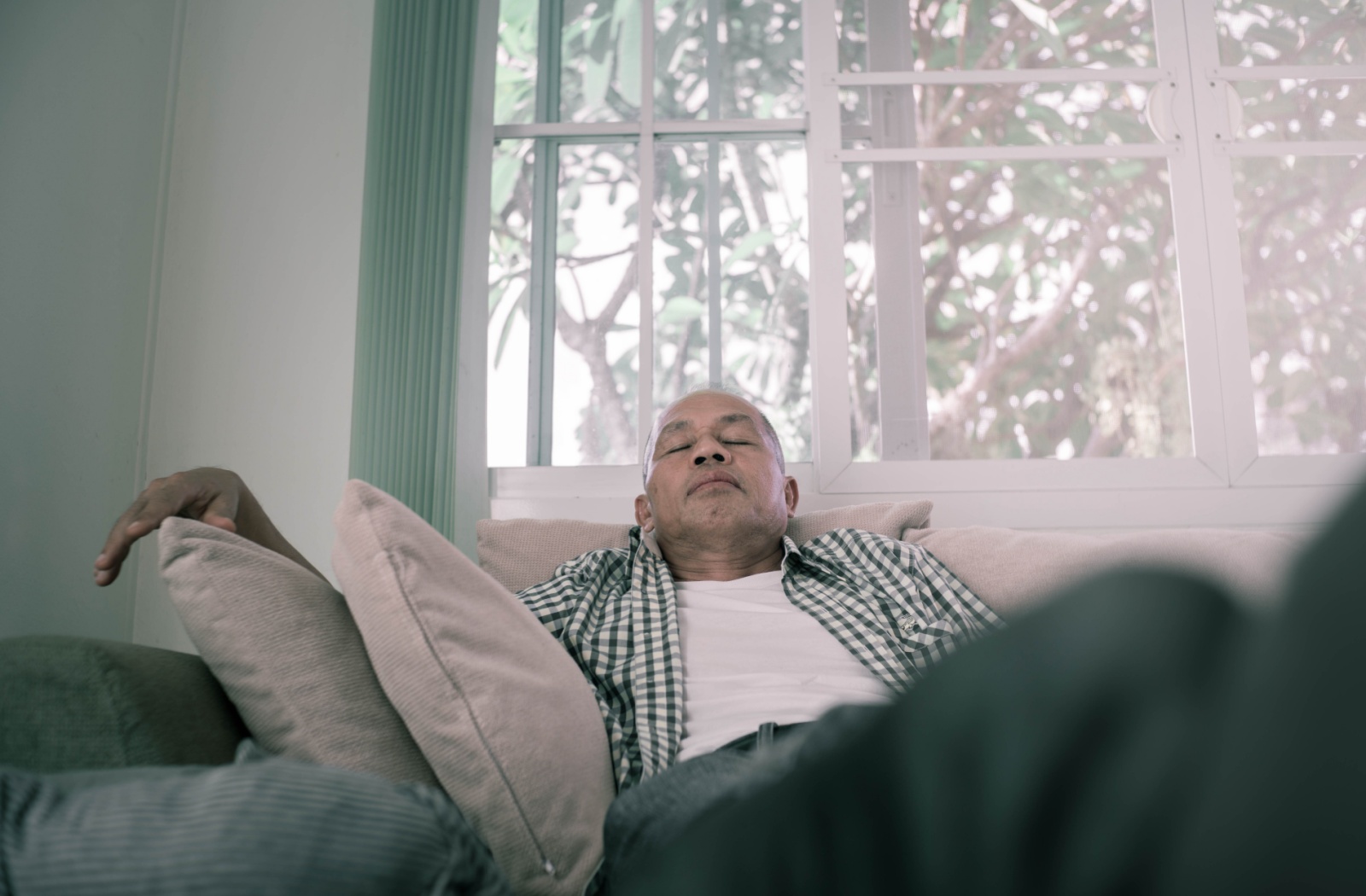It’s common for caregivers and family members to notice significant changes in the sleeping patterns of their loved ones with dementia. Excessive sleep may raise questions, concerns, and sometimes even frustration. Why does this happen? Is it normal? How can you ensure your loved one is comfortable and supported?
Fortunately, it may bring you some relief to know that it’s pretty common for people with dementia to sleep a lot, especially as their condition progresses. This is due to physical changes in the brain that arise as dementia progresses and cause people to become exhausted more quickly.
Dementia’s Effect on Sleep Patterns
Sleep disturbances are a hallmark of many forms of dementia. These changes can range from difficulty falling asleep to excessive daytime napping.
Alzheimer’s Disease
In the case of Alzheimer’s disease, the most common form of dementia, sleep issues are frequent. People with Alzheimer’s may experience:
- Difficulty maintaining a regular sleep schedule: This may lead to fragmented sleep patterns with frequent awakenings at night.
- Daytime drowsiness: Due to poor sleep quality at night, many feel tired and nap throughout the day.
- Sundowning: A common phenomenon where individuals become restless, agitated, or confused during the late afternoon or evening, disrupting their ability to relax and prepare for sleep.
Lewy Body Dementia
Lewy Body Dementia connects closely to sleep disturbances. These may involve:
- REM sleep behavior disorder (RBD): This condition causes individuals to act out dreams, sometimes leading to unintentional harm.
- Excessive daytime sleepiness: A heightened need for sleep during the day that may impair engagement in daily activities.
- Fluctuating states of alertness: Some people living with Lewy Body Dementia may alternate between drowsiness and wakefulness, contributing to irregular sleep rhythms.
Vascular Dementia
People with vascular dementia often face unique sleep-related challenges, such as:
- Interrupted sleep due to reduced blood flow: Brain damage caused by stroke or other vascular issues may disrupt natural sleep-wake cycles.
- Comorbid conditions: Health issues like sleep apnea or cardiovascular disease may exacerbate sleep difficulties.
- Difficulty regulating natural body rhythms: This inability to maintain a predictable pattern of activity and rest increases feelings of fatigue.
Understanding the differences between different types of dementia provides critical insight into why a person’s sleep patterns can shift so drastically, paving the way for more empathetic and targeted care.
Why Do People with Dementia Sleep a Lot?
Excessive sleep in individuals with dementia is not uncommon, but it’s often linked to physiological and environmental factors. Here are some reasons why your loved one with dementia may be sleeping more:
Brain Changes
Dementia causes physical changes in the brain, particularly in regions controlling sleep and wake cycles. Brain degeneration reduces the ability to regulate these rhythms, leading to increased drowsiness during the day and extended sleep periods.
Energy Levels & Cognitive Decline
Performing even basic tasks can become exceptionally taxing for those with dementia. Over time, cognitive decline means that more energy is required for daily activities, resulting in exhaustion and the need for more rest.
Medications
Medication regimens for individuals with dementia often include drugs for pain management, mood stabilization, or behavioral issues. Unfortunately, many of these medications list drowsiness as a side effect, contributing to increased sleep.
Underlying Health Conditions
Additional health challenges, such as sleep apnea, depression, or infections, also affect energy levels and sleep quality. Seniors with dementia may be more vulnerable to these conditions, exacerbating their need to sleep.
Given this range of contributors, personalized attention is essential to understand and address a loved one’s unique sleep needs.
How Memory Care Helps Improve Sleep Quality

Memory care communities specialize in supporting individuals with dementia through structured routines, personalized care, and calming environments. These elements are central to promoting restful sleep while addressing common dementia-related challenges.
Establishing Consistent Routines
A consistent daily schedule helps regulate sleep-wake cycles. Memory care provides a rhythm of scheduled meals, activities, and rest periods to create predictability and balance.
Creating a Sleep-Friendly Environment
Memory care communities provide comforting spaces to enhance residents’ rest. This includes dimmed evening lighting, reduced noise levels, and calming nighttime routines to prepare residents for a good night’s sleep.
Addressing Medical & Cognitive Needs
Memory care teams work closely with healthcare professionals to adjust medications, manage comorbid conditions, and provide therapies that can improve overall well-being. This comprehensive approach aims to reduce factors contributing to excessive sleep.
Promoting Engagement During the Day
Memory care reduces daytime lethargy and promotes nighttime sleep by involving residents in meaningful social and physical activities. Activities like light exercises, art therapy, or music programs keep individuals engaged throughout the day.
These compassionate strategies ensure residents receive the support they need for better sleep and well-being.
How Memory Care Supports Seniors with Dementia
Beyond sleep care, memory care communities provide holistic support to help seniors with dementia live fulfilling and dignified lives.
Person-Centered Care Plans
Each resident benefits from a tailored care plan based on their unique needs, preferences, and history. Care teams ensure every detail of a resident’s routine aligns with their comfort and dignity.
Highly Trained Care Teams
Memory care staff receive specialized training to understand the complexities of dementia. They approach every interaction with warmth, patience, and empathy, fostering trust and security for residents.
Support for Families
Caring for a loved one with dementia can be emotionally and physically overwhelming for family caregivers. Memory care communities provide families peace of mind, knowing their loved one is safe, happy, and well cared for.
Building Community
Memory care doesn’t just support individuals; it fosters connections among residents, families, and staff. This sense of belonging creates a nurturing and loving environment for everyone involved.
Compassionate memory care services transform the quality of life for seniors with dementia and those who love them.
Supporting You and Your Loved One
Navigating the challenges of dementia isn’t easy, but you don’t have to do it alone. Whether concerned about your loved one’s sleep patterns or seeking a nurturing community, memory care offers solutions and support tailored to your needs.
At All American Assisted Living at Washington Township, we provide optimal memory care in a nurturing environment that still feels like home. Contact us today to learn how our community can enhance your loved one’s well-being.





